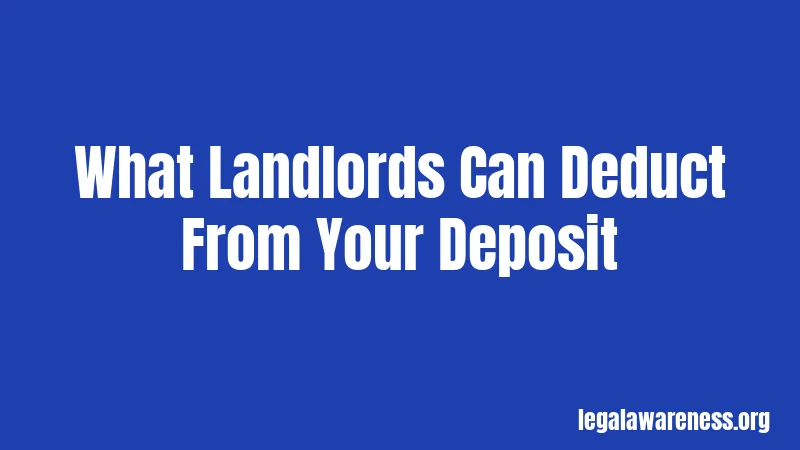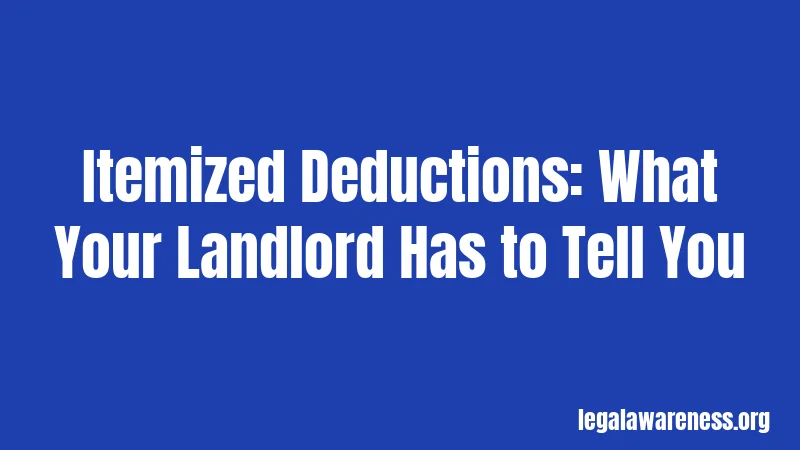California Security Deposit Laws (2026): What Landlords Can’t Do With Your Money
Here’s something that happens way too often: a tenant moves out, their landlord keeps their security deposit, and the tenant never hears why. Sound familiar? Well, in California, landlords have very strict rules about what they can and can’t do with your security deposit. Breaking these rules can actually cost them serious money. Let’s walk through exactly what you need to know to protect yourself.
Whether you’re renting for the first time or you’ve been a tenant for years, understanding these laws is crucial. California takes security deposits seriously, and the penalties for violations are real. You’ve got legal protection here, and honestly, it’s worth knowing what it is.
What Is a Security Deposit?

Think of a security deposit as a safety net. When you sign a lease and move into a rental property, you typically pay money upfront to your landlord. This money is held as a guarantee that you’ll pay rent and take care of the place. It’s not rent. It’s not a fee. It’s your money, held in trust.
Here’s the key thing: it belongs to you until the landlord has a legitimate reason to keep it. That’s an important distinction, and it’s what all of California’s security deposit laws are built around.
Basic California Security Deposit Laws
What Landlords Can Charge
In California, landlords can charge up to two months’ rent for furnished apartments. For unfurnished apartments, they can charge up to one month’s rent. Yep, that’s the hard limit. Anything more than that? That’s illegal.
Some people get confused about this. The limit applies whether you’re signing a new lease or renewing an old one. Your landlord can’t just decide to charge more because they feel like it. These limits are set in state law, and they don’t change.
What about other deposits or fees? This gets tricky. California calls anything that’s meant to be returned to you a deposit. So if your landlord tries to call something a “non-refundable fee” that’s really meant to be security, California sees through that. The deposit limits still apply.
Where Your Money Has to Go
Okay, pause. Read this carefully. California requires landlords to deposit your money in a separate account. Not in their personal checking account. Not mixed with other tenants’ money in a general account. It needs to be in a bank account specifically designated for tenant deposits.
Here’s why this matters: if the landlord files for bankruptcy, your money is supposed to be protected because it’s in a separate account. Without this rule, your deposit could get swept up in other business debts.
Your landlord also has to tell you which bank the money is in and what account number. They have to do this in writing before they can keep your deposit. If they don’t, you might have grounds to sue.
Interest and Refunds
This part surprises people. In California, landlords don’t have to pay you interest on your security deposit. That’s right, even if they’re holding your money for years, they don’t owe you a penny of interest. (Unless your city has a local law requiring it, but that’s rare.)
However, they do have to return your money. The law says landlords have 21 days after you move out to either return your full deposit or give you an itemized statement of deductions. Not 30 days. Not “whenever they get around to it.” Twenty-one days.
That’s actually the most important deadline in California security deposit law. Miss it, and landlords are in serious trouble legally.
What Landlords Can Deduct From Your Deposit

Damage Beyond Normal Wear and Tear
This is where landlords get confused, and that confusion protects tenants. Landlords can only deduct for damage that goes beyond normal wear and tear. Normal wear and tear is free. You don’t pay for it.
So what’s normal? Faded paint, slightly worn carpet, small nail holes from hanging pictures, a little scuffing on walls from furniture. These things happen when people live somewhere. Landlords can’t charge you for them.
What’s not normal? Huge holes in walls, broken windows, stained or torn carpet, broken appliances that you broke, holes from anchors or command strips that damaged the walls. These are damages that exceed normal wear and tear, and landlords can deduct for them.
Here’s the thing though: landlords have to prove the damage happened because of something you did. If the carpet was already stained when you moved in, they can’t charge you for it. This is why that move-in inspection is so important. Document everything.
Unpaid Rent
Landlords can deduct unpaid rent from your security deposit. This seems straightforward, right? It is, mostly. But here’s the catch: they have to have actually given you proper eviction notice. They can’t just secretly deduct your rent and keep quiet about it. They have to follow legal procedures.
Also, unpaid rent deductions have to be listed separately on the itemized statement. Your landlord can’t lump it together with other charges.
Lease Violations and Cleaning
Some leases include rules about cleaning. If you leave the unit completely trashed and it requires professional cleaning beyond normal move-out cleaning, landlords can charge for that. But again, normal cleaning is on them. They’re preparing the place for the next tenant anyway.
Lease violations are trickier. Landlords can deduct for actual damages caused by violations, but they usually can’t just charge a flat fee for rule-breaking. They have to charge for the actual cost of whatever happened.
Penalties When Landlords Break the Rules
Consequences for Keeping Your Deposit Illegally
Ready for this? If a landlord doesn’t return your deposit within 21 days without a valid reason, or if they don’t provide an itemized statement, California law says you can sue for the full amount of the deposit plus additional penalties.
The additional penalties are where it gets serious. You can recover up to two times the amount of the wrongfully withheld deposit, plus your actual damages and attorney’s fees. So if your landlord illegally kept $2,000, you might be able to recover $4,000, plus money for any harm you suffered, plus attorney’s fees.
Courts take this seriously. This isn’t a small claims matter that gets laughed out of court. Landlords know the law, and judges expect them to follow it.
Interest and Double Damages
California specifically allows tenants to recover double damages if a landlord acts in bad faith. Bad faith means the landlord knew they were breaking the law or acted recklessly. It doesn’t have to be intentional, but it has to show a lack of care about following the rules.
Many cases result in tenants winning. The law is that clear, and the penalties are that steep.
Attorney’s Fees
Here’s something that matters a lot: if you win your case, the landlord has to pay your attorney’s fees. This means you don’t necessarily have to pay out of pocket to have a lawyer represent you. That’s a huge protection for tenants.
Itemized Deductions: What Your Landlord Has to Tell You

What Must Be Included
When a landlord returns your deposit (or doesn’t), they have to give you a written itemized statement. This statement has to list every single charge they’re making against your deposit. It can’t be vague. “Repairs” isn’t enough. They have to say what was repaired and how much it cost.
For each deduction, your landlord should provide the following information: a description of the damage, the cost to repair or replace it, and ideally the receipt or invoice. A lot of landlords skip the receipts, which actually hurts them in court.
The statement also has to include the bank information where the deposit was held and explain how they calculated the amount being returned to you. Sound complicated? It’s actually pretty straightforward. Your landlord just has to be transparent.
When Itemization Is Required
Even if your landlord is returning your entire deposit, they still have to send you an itemized statement. Seriously. If they’re keeping any part of it, the itemization is required. If they’re not keeping anything, some landlords skip the paperwork. This is actually a violation.
California requires the itemized statement in all cases where deductions are made. No exceptions.
The 21-Day Timeline: The Most Important Rule
Let me be crystal clear about this because it’s the single most important rule in California security deposit law. Your landlord has 21 calendar days from the date you move out to do one of two things:
Return your full deposit with a written statement, OR provide you with an itemized list of deductions and return the remaining amount.
That’s it. Not 30 days. Not “a few weeks.” Twenty-one days. This timeline is strict, and violations are costly for landlords.
Many tenants don’t know this, so they wait and wait thinking something’s normal. It’s not. If it’s been more than 21 days with no response, you might have a legal claim.
Special Circumstances and Exceptions
Moving Out Early
If you break your lease and move out early, your landlord still has the same 21-day rule. Early exit doesn’t change the timeline. They can still deduct legitimate damages and unpaid rent, but the deadline remains the same.
Lease-Breaking Fees and Early Termination
Here’s something landlords sometimes try to pull: they claim the security deposit covers an early termination fee. California law says no. A security deposit is for security, not for covering lease violations or early termination fees. Those are separate charges that should be addressed separately in your lease.
If your lease says you owe money for early termination, that’s a separate debt. Your landlord can’t just take it from the security deposit without your permission. They have to sue you separately to collect it.
Unit Damage vs. Normal Wear and Tear: Gray Areas
Some situations are genuinely in the gray area. For example, what if the carpet is worn down in the high-traffic areas? Is that normal wear and tear, or is it the tenant’s fault? These cases can be subjective, which is why documentation matters.
If you’re ever disputed on something, photos from your move-in date are gold. They prove the condition when you arrived. They’re almost impossible to argue against in court.
Roommate Situations
When multiple people sign a lease, the landlord has to return the full deposit or send the itemized statement to the address you provide. Ideally, coordinate with your roommates about where the check should go. If the landlord sends it to one person, that person has a legal obligation to split it with the others.
How to Protect Your Security Deposit
Document Everything at Move-In
Take photos or videos of the apartment when you move in. Show the condition of walls, floors, appliances, bathroom, everything. Email these to yourself with timestamps. This is your proof of the condition before you lived there.
Better yet, do a walk-through with your landlord and both sign off on the condition. Some landlords provide a checklist. Fill it out and keep a copy. This simple step prevents so many disputes later.
Keep Records of Everything
Keep copies of your lease, your move-in inspection photos, receipts for any repairs you made, and proof of rent payments. Keep your bank statements showing you paid rent on time. These documents prove you’re a responsible tenant.
If there’s ever a dispute, you want to be the person who can show exactly what happened. You want to have documentation. Your landlord might not.
Get Everything in Writing
When you give notice that you’re moving out, do it in writing. Text, email, or letter, but get it in writing and keep a copy. When your landlord acknowledges your move-out date, save that too.
This proves the exact date you moved out, which starts the 21-day clock. Disputes sometimes happen about when you officially vacated, and written documentation wins those arguments.
Follow Up After 21 Days
Set a reminder for day 22. If you haven’t received your deposit or an itemized statement, follow up. Send an email to your landlord asking where your deposit is and referencing the 21-day requirement under California law.
This creates a paper trail. If you end up suing, this email proves you tried to resolve it. It also reminds the landlord of their legal obligation and often prompts them to act.
Know Your Rights
You have the right to see the itemized statement. You have the right to deduct actual costs only. You have the right to have your deposit held in a separate account. You have the right to be treated fairly.
If your landlord violates these rights, you have the right to sue. You have the right to recover your money plus penalties. Know these rights and don’t be shy about stating them if needed.
When to Take Legal Action
Small Claims Court vs. Civil Court
For most security deposit disputes, small claims court is the way to go. The process is simpler, faster, and you don’t necessarily need a lawyer. California small claims courts can handle cases up to $10,000 (in most counties).
If you want to recover attorney’s fees or if the amount is larger, you might use civil court. But honestly, small claims is where most people win these cases.
Getting a Lawyer
If you think you have a strong case, you can contact a tenant rights lawyer. Many offer free consultations. Some work on contingency, meaning they only get paid if you win. Since California allows attorney’s fees as part of the award, this is actually a realistic option.
How to Sue Your Landlord
You’ll need to file a lawsuit in the appropriate court. You’ll need your lease, your move-out date, the 21 days passing without response, and documentation of the dispute. Then you present your case to the judge.
Honestly, just the threat of legal action often makes landlords cooperate. They know the law. They know the penalties. A polite email referencing California Civil Code section 1950.7 sometimes is all it takes.
Frequently Asked Questions
Can my landlord keep my deposit for unpaid utilities?
No. Utilities are typically the tenant’s responsibility and should be transferred to the utility company. Landlords can only deduct from security deposits for items specifically allowed by law: damage beyond normal wear and tear, unpaid rent, and lease violations that caused actual damage. They can’t deduct for utilities they paid on your behalf unless your lease specifically says they can.
What if my landlord never gave me the bank information for my deposit?
That’s a violation of California law. Document this immediately. Get it in writing that they won’t provide it. This is actually a strong legal claim on its own because it suggests they didn’t deposit the money separately at all.
Can I negotiate deductions with my landlord?
You can try, but you’re not required to. Your landlord can’t legally keep money they shouldn’t. They can only deduct for legitimate reasons under the law. If you disagree with a deduction, you don’t have to accept a settlement unless it’s fair.
What if my landlord sold the property before returning my deposit?
The new owner takes on the responsibility for the deposit. The previous landlord still owes you the money too. They can’t use the property sale as an excuse. You can sue either one or both of them.
How long does a security deposit lawsuit take?
Small claims cases usually take a few months from filing to judgment. Sometimes longer depending on the court’s schedule. Civil court cases can take longer. But once you win, you get your money back plus penalties and attorney’s fees.
Final Thoughts
California’s security deposit laws are clear, and they exist to protect you. Your landlord has to follow specific rules about where the money goes, what they can deduct, and how fast they have to return it.
Don’t be intimidated by your landlord. You have rights here, and the law backs you up. Document your move-in condition, keep records, and follow up if they miss the 21-day deadline. If they break the rules, you can sue and you’ll likely win.
Here’s the bottom line: your security deposit is your money. Landlords are holding it in trust. They have to follow strict rules or face serious penalties. Now you know the rules too, which puts you in a great position to protect yourself.
References
California Civil Code Section 1950.7: Security Deposits (Official Statute)
California Tenant Rights and Responsibilities Guide
Legal Aid Work-Group: California Security Deposit Laws
California Consumer Legal Remedies Act and Security Deposits
CalTenants: Tenant Union of California – Deposit Information

The tenants is insisting to use her deposit for last month rent